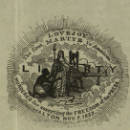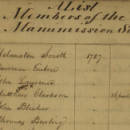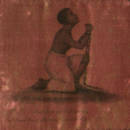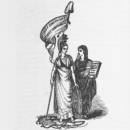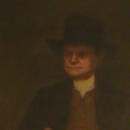
Isaac T. Hopper
By Celia Caust-Ellenbogen
Swarthmore College, Class of 2009. Quakers & Slavery Digitization Project Intern
1771 - Birth
Isaac Hopper was born in Woodbury, New Jersey in 1771. His family background was heavily Quaker, although his parents, Levi and Rachel Tatem Hopper, were not members of the Society of Friends at the time of his birth. Levi had been disowned for marrying outside of the Society, although he was later restored to membership; Rachel was received into the Society of Friends in 1791. (Read two mottos signed by Isaac Hopper, written in 1845 and 1848.)
1787 - Philadelphia
At the age of 16, Hopper moved to Philadelphia to take a position as an apprentice, and soon began his career as a tailor. Meanwhile, he took it upon himself to help the less fortunate whenever possible. In her biography of Isaac Hopper, L. Maria Child dates his first act of helping an escaped slave to shortly after his arrival in Philadelphia; she records an estimate that he assisted over 1,000 fugitives during his forty years of residence in Philadelphia (Child 33-35, 201). He was elected to membership with the Pennsylvania Abolition Society in 1796, and soon gained a reputation for devising cunning legal maneuvers to obtain freedom for colored people. Hopper also volunteered as an overseer at the Benezet school for colored children, a teacher for colored adults, a fire-fighter, a Guardian of the Poor for the City of Philadelphia, and an Inspector of the Public Prisons; he served on Friends' committees to assist the poor, work with Native Americans, and counsel Friends who refused to pay militia taxes. (In an 1847 letter, Hopper recalls leaving his childhood friend Joseph Whitall to go to Philadelphia and become a tailor.)
1792 - Quaker Membership
In October of 1792, Hopper was received into membership by Philadelphia Monthly Meeting. He was likely motivated in part by his childhood love for Sarah Tatum, who came from a strict Quaker family, and from his own family background. (Hopper admonishes those who depart from old Quaker plainness in this letter to his daughter, written in 1847.)
1795 - Marriage to Sarah Tatum
Isaac Hopper married Sarah Tatum, his childhood sweetheart, in 1795. The couple had a dozen children together, eight of whom survived childhood. Sarah Hopper died in 1822. (Isaac Hopper wrote a letter to his eldest daughter in 1839, sharing his memories of her mother and his first wife, Sarah Tatum Hopper.)
1811 - Disownment (I)
In his total commitment to helping the less fortunate, Hopper sometimes neglected to secure his own finances. Hopper's pecuniary difficulties intensified when he fell ill in 1809, and was unable to fulfill his debts. He was disowned by his monthly meeting in 1811 for "departing at times from the truth of his assertions, violating his promises, and failing in the discharge of his just debts." His membership was reinstated in 1820, but he was never entirely free of debts (Bacon 76-80). (In a letter from 1834, Hopper assures a business partner that he will take responsibility for debts. See a summary of money due to Isaac Hopper in 1841 for supplies purchased on behalf of the New-York Association of Friends for the Relief of those Held in Slavery &c.)
1824 - Marriage to Hannah Attmore
One and a half years after the death of his first wife, Hopper married Hannah Attmore in 1824. They had four children together, but two died during the Cholera Epidemic of 1832. (Hopper mentions his marriage to Hannah in this letter to Elias Hicks.)
1827 - Disownment (II)
Beginning in the late 1820s, the teachings of Elias Hicks began to cause controversy within the Society of Friends. In Philadelphia, New York, and Baltimore, two separate yearly meetings were formed, commonly called "Hicksite" and "Orthodox" branches. Isaac Hopper and Elias Hicks were close friends, and Hopper was an outspoken advocate of the Hicksite cause; his friend and biographer L. Maria Child described him as "the Napoleon of the battle" (Child 285). This description is particularly fitting given that Hopper bore a remarkable resemblance to Napoleon Bonaparte (Child 248, 314). Hopper was disowned from the South District Monthly Meeting (Orthodox) in 1827, but by that time he was already established in an equivalent Hicksite group that considered itself a legitimate meeting; Hopper and most of his friends discounted the other meeting's authority to disown him. (Bacon 86-87). (Read a letter from Isaac Hopper to Elias Hicks. Read Hicks's response.)
1829 - New York City
After the Hicksite-Orthodox split, Hopper's tailoring business lost many of its Orthodox Quaker clients. In the midst of pecuniary difficulties, he agreed to move to New York City in 1829 to run a bookstore catering to Hicksite tastes. He also published a Hicksite magazine, "The Friend, or the Advocate of Truth," and after that he started the "Friends Intelligencer" in 1838. Meanwhile, Hopper continued to pursue his philanthropic goals with unabated zeal. An anti-abolitionist mob threatened his bookstore in 1834 (although he managed to fend them off). By that time Hopper was well-known in New York, and across the country, for sheltering fugitive slaves. (While travelling in Savannah (Georgia) in 1837, John Hopper was recognized as Hopper's son and confronted by an anti-abolitionist mob. He narrowly escaped with his life.)
1830 - Travels in Great Britain
In 1830-31 Hopper traveled to Great Britain to settle a family affair, and combined his business with religious visits to Jordans meeting house, among other places (Bacon 97). Upon his arrival, he discovered that British Friends, apprised of the recent schism among American Friends, viewed Hicksites with suspicion. Hopper was particularly dismayed to learn of a certain letter circulating among British Friends that maligned him in particular and warned young Friends to avoid contact with him. However, with his good humor and thoughtful bearing, Hopper managed to win the respect and admiration of most of the people he met while abroad. (Isaac Hopper's letters home detail his journey abroad.)
1832 - Cholera Epidemic
A cholera epidemic hit New York City in 1832, killing several thousand residents (primarily lower-class slum inhabitants). The deaths of two of Isaac and Hannah's children--Thomas, not yet 4 years old, and Hannah, about 2--brought the terror and the tragedy of such an epidemic into the Hopper home. (Read Isaac Hopper's letters to his daughter in Philadelphia about the epidemic.)
1838 - The Darg Affair
In 1838, a slave named Thomas Hughes ran away from his master, John P. Darg. Like many fugitive slaves before him, Hughes went to New York City and sought out Isaac T. Hopper for shelter; but unlike them, Hughes had a secret. He had stolen $8,000 from his master before escaping. When Hopper discovered the truth about Hughes, he consulted with fellow abolitionists including Barney Corse, a Friend, and David Ruggles, a free black man. Under the circumstances, they concluded that they must rightfully return Darg's money--but, they decided, it would still be wrong to surrender Hughes back into slavery. Instead, they negotiated a compromise: if (most of) Darg's money was returned to him, he agreed to manumit Hughes. In accordance with this agreement, the majority of Darg's money was restored to him; Hughes served two years in prison for his theft (the minimum sentence); and upon his release from prison, Hughes was no longer a slave. Meanwhile, controversy raged over the question of the abolitionists' behavior, particularly within the Society of Friends. Some Quakers insisted that Hopper had gone too far in helping a fugitive slave who was also a thief; George Fox White claimed, "I had a thousand times rather be a slave, and spend my days with slaveholders, than to dwell in companionship with abolitionists." (Bacon 113-117; "A Rare Specimen of a Quaker!"). (Abby Hopper Gibbons defends her father's actions in a letter. Isaac Hopper tells Hughes' Tale of Oppression.)
1840 - American Antislavery Society
Isaac Hopper became book agent and treasurer of the American Anti-Slavery Society in 1840. He served on the Executive Committee, and contributed a column entitled "Tales of Oppression" to the Society's official publication, "The National Anti-Slavery Standard." In 1841, Lydia Maria Child, who would later become Hopper's biographer, took over editorship of "The Standard." (Hopper describes the role of "The National Anti-Slavery Standard" as a defense against untrue attacks on abolitionists.)
1842 - Disownment (III)
On March 25,1841, the "National Anti-Slavery Standard," the official publication of the American Anti-Slavery Society, ran an article headlined "A Rare Specimen of a Quaker!" The titular specimen was Quaker minister George Fox White; the article accused him of being "in the constant practice of denouncing abolitionists in the most offensive and opprobrious terms." Complaints were subsequently lodged with New York Monthly Meeting (Hicksite), that the article "excite[d] discord and disunity" amongst the Society of Friends, contrary to discipline. The article's author, Oliver Johnson, was not a Quaker, but the meeting determined that the Executive Committee of the American Anti-Slavery Society should be held responsible for the contents of the publication (Bacon 130). Only three members of the Executive Committee fit both criteria of being Quaker and residing full-time in New York City: Isaac T. Hopper, his son-in-law James S. Gibbons, and Charles Marriott. After over a year of deliberation, the men were disowned in 1842. Nonetheless, they continued to attend religious meetings, and 40 years later--after the abolition of slavery--New York Yearly Meeting acknowledged regret for disowning them. (Read a minute of the disownment proceedings by the Hester Street Overseers. Read letters written by Isaac Hopper referring to his disownment proceedings: March 1841, May 1841, October 1841 and January 1843. Read the acknowledgement composed by Aaron M. Powell.)
1845 - The Prison Association
Before Isaac Hopper moved to New York, he volunteered as a prison inspector in Philadelphia. Indeed throught his life he was quick to offer advice, aid, and support to convicts. But in 1845, after he retired from his position at the American Anti-Slavery Society, he began to devote all his energies to the causes of prison reform and assisting ex-prisoners. He was a driving force behind the Prison Association from its inception in 1845, until just before his death in 1852. (Read a letter of gratitude to Hopper from a former prisoner, and a letter of inquiry by Hopper seeking employment for a woman former prisoner. See also this resolution from the Executive Committee of the Prison Association accepting Hopper's resignation for reasons of poor health.)
1852 - Death
Isaac Hopper died on May 7, 1852. He spoke his final words to Lydia Maria Child, soon to become his biographer: "Tell them I love them all" (Child 480). (Read a memorial of Isaac T. Hopper presented by William Lloyd Garrison at the Yearly Meeting of Congregational Friends at Waterloo, N.Y.)
References
Bacon, Margaret Hope. Lamb's Warrior: The Life of Isaac T. Hopper. New York: Thomas Y. Crowell Company, 1970.
Child, Lydia Maria. Isaac T. Hopper: A True Life. Boston: John P. Jewett and Company, 1854.
Hopper, Isaac T. Isaac T. Hopper Papers. Friends Historical Library of Swarthmre College, RG5 115 and SC 058.
Hopper, Isaac T. Kidnappers in Philadelphia: Isaac Hopper's Tales of Oppression, 1780-1843, [compiled by] Daniel E. Meaders. New York: Garland Pub., 1994. Series: Studies in African American History and Culture, edited by Graham Hodges.
Hopper, Isaac T. Narrative of the Proceedings of the Monthly Meeting of New-York, and their Subsequent Confirmation by the Quarterly and Yearly Meetings, in the Case of Isaac T. Hopper. New York: 1843.

